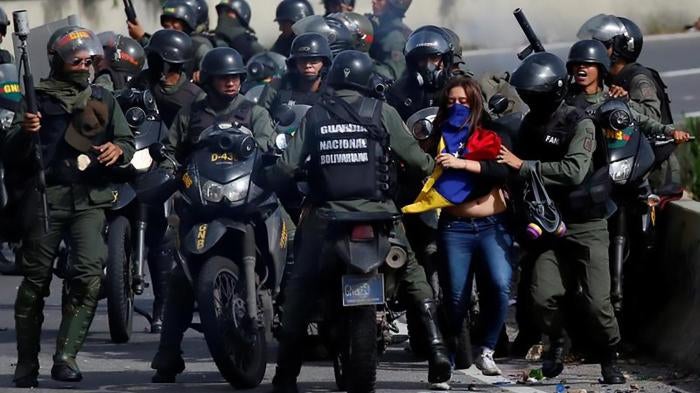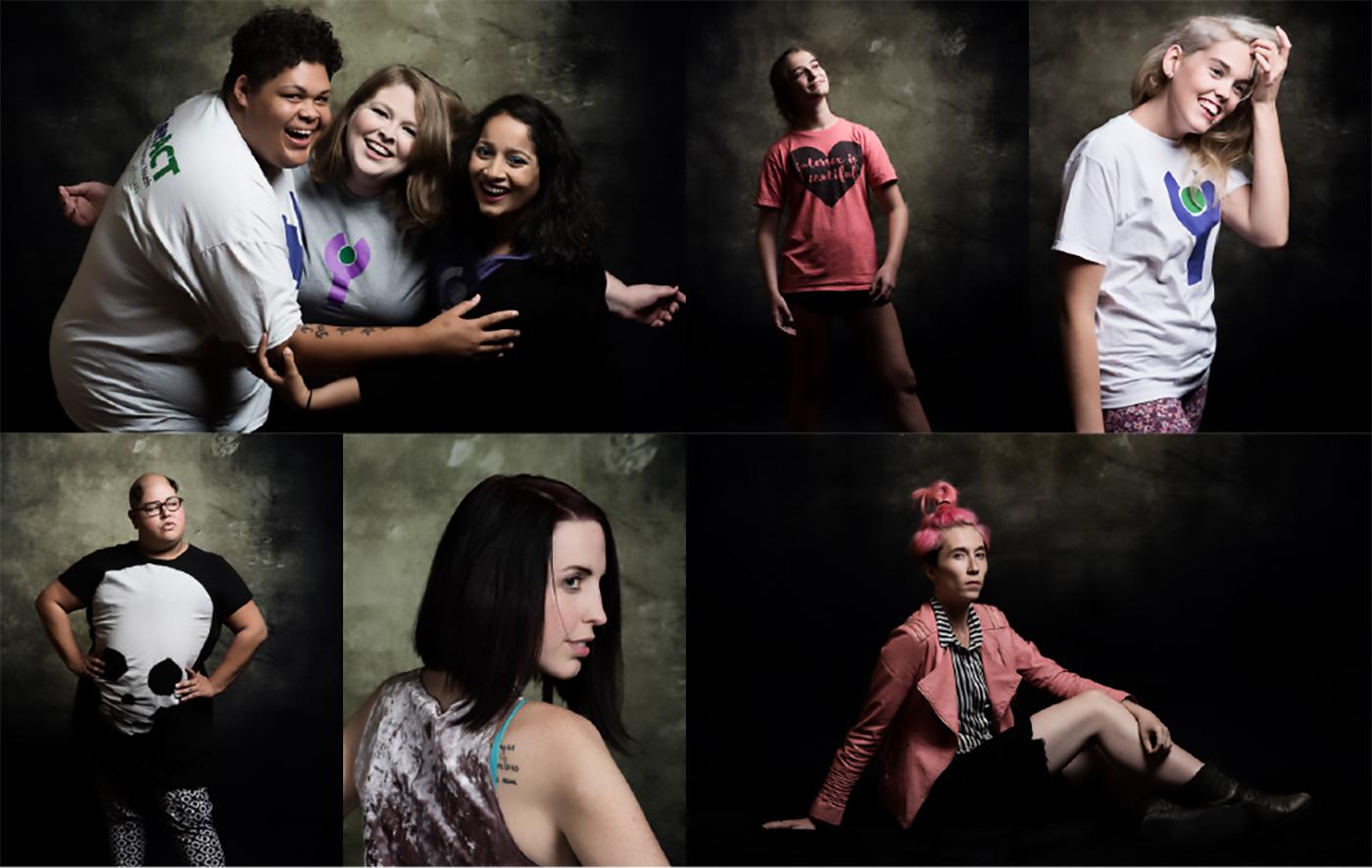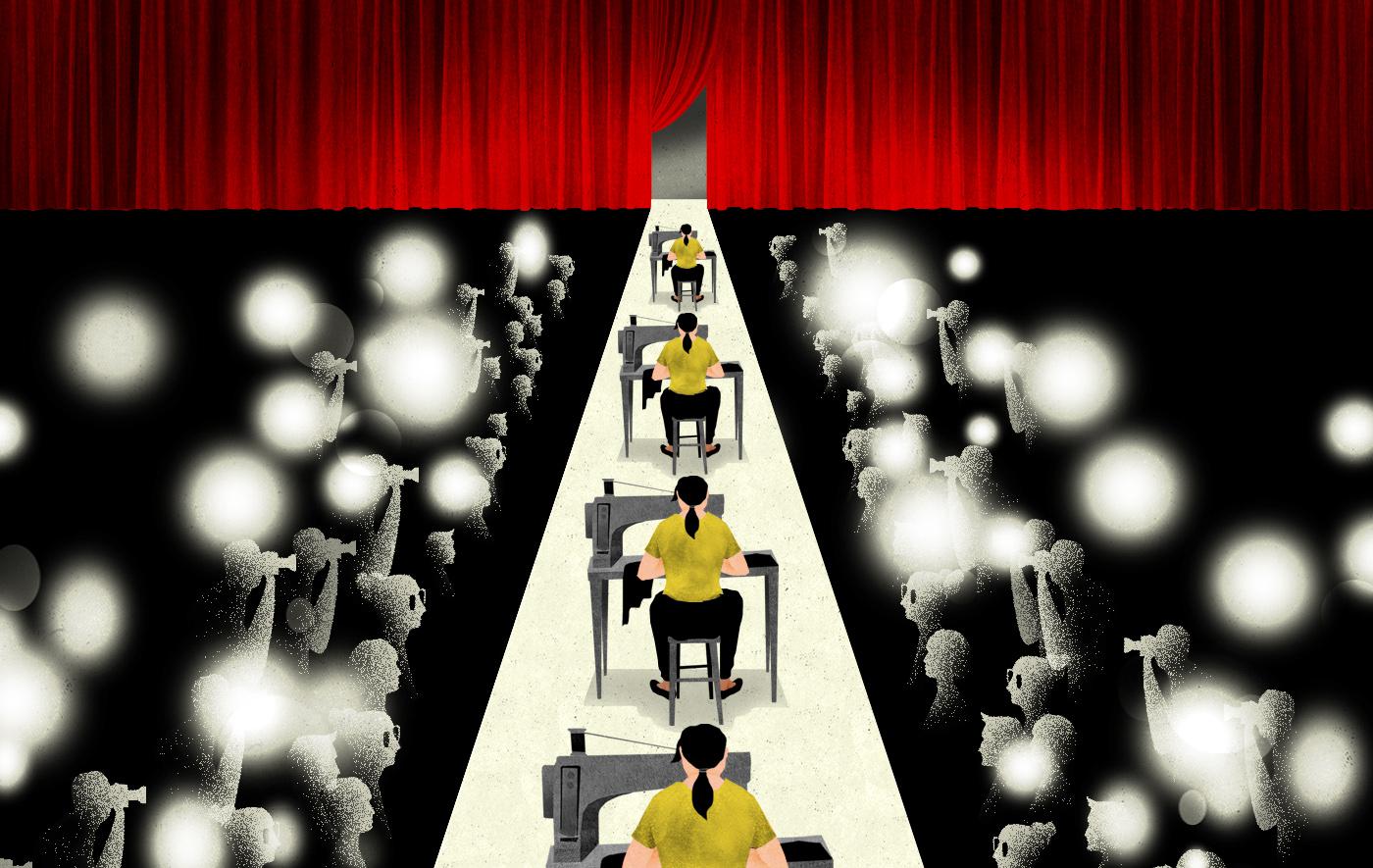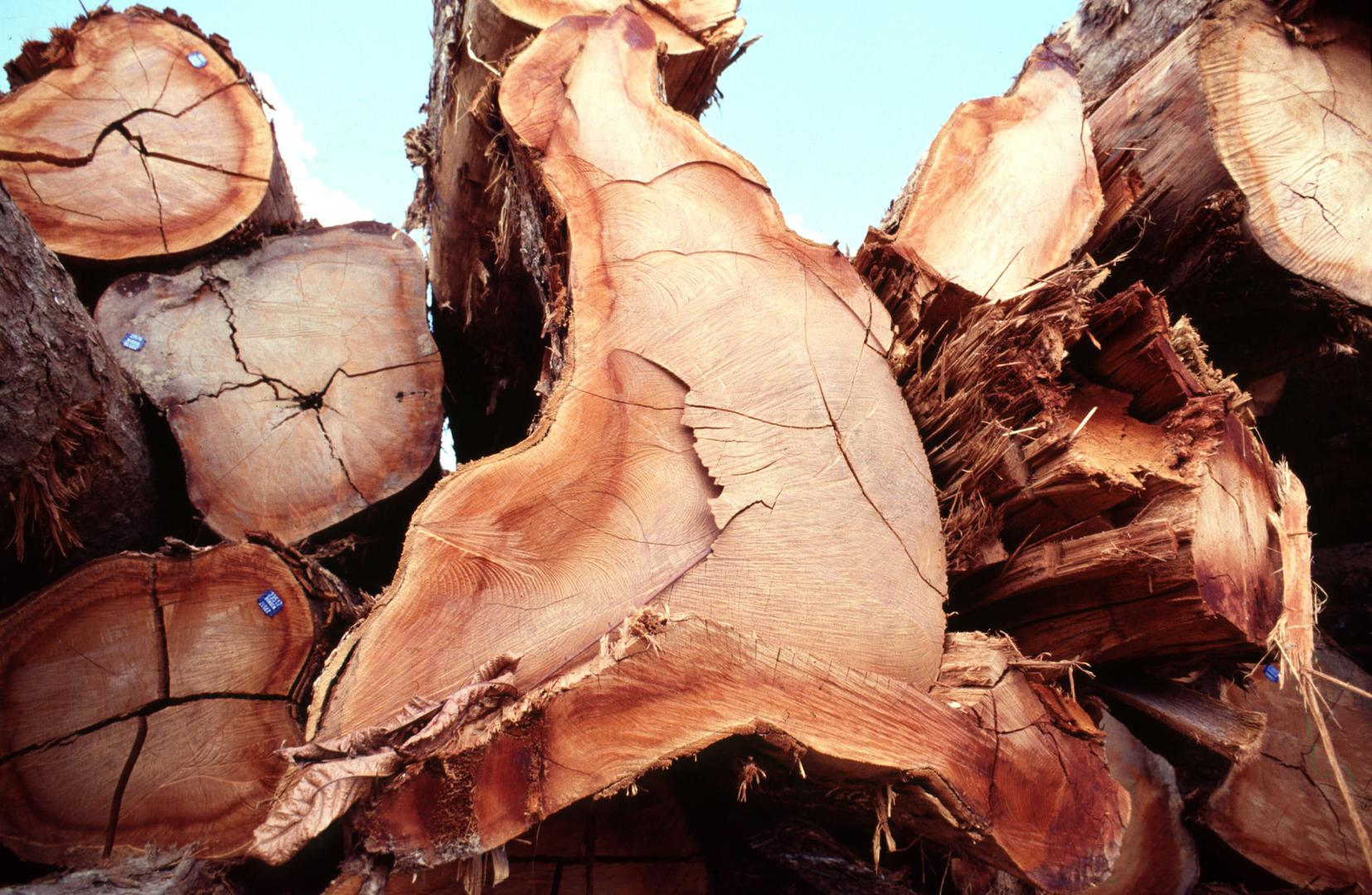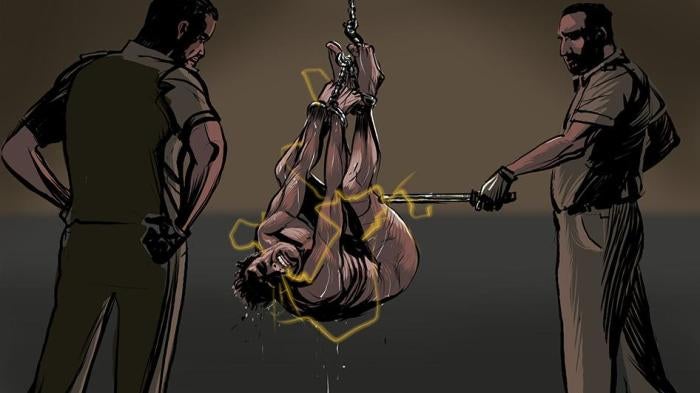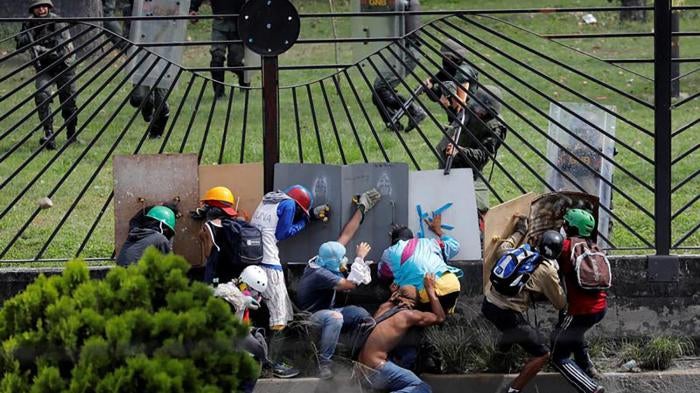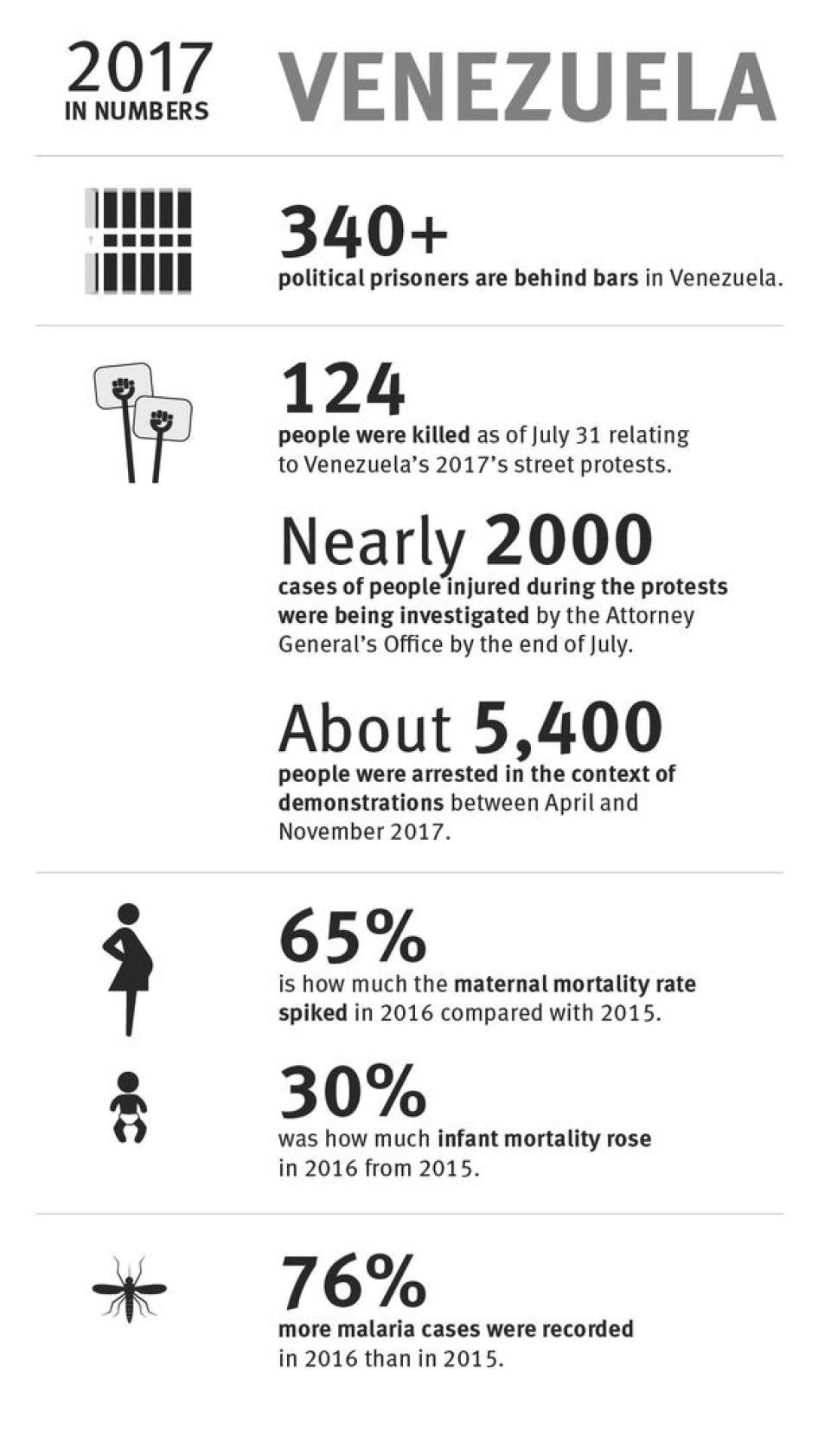In Venezuela today, no independent government institutions remain to act as a check on executive power. The Venezuelan government—under Maduro and previously under Chávez—has stacked the courts with judges who make no pretense of independence.
Due to severe shortages of medicines, medical supplies, and food, many Venezuelans cannot adequately feed their families or access the most basic healthcare. In response to the human rights and humanitarian crisis, hundreds of thousands of Venezuelans are fleeing the country.
Other persistent concerns include poor prison conditions, impunity for human rights violations, and harassment by government officials of human rights defenders and independent media outlets.
Persecution of Political Opponents
The Venezuelan government has jailed political opponents and disqualified them from running for office. At time of writing, more than 340 political prisoners were languishing in Venezuelan prisons or intelligence services headquarters, according to the Penal Forum, a Venezuelan network of pro-bono criminal defense lawyers.
In mid-2017, the Supreme Court sentenced five opposition mayors, after summary proceedings that violated international norms of due process, to 15 months in prison and disqualified them from running for office. At time of writing, one was being held at the intelligence services’ headquarters in Caracas; the rest had fled the country. At least nine more mayors were subject to a Supreme Court injunction that could lead to similarly long prison sentences if they are accused of violating it.
Opposition leader Leopoldo López is serving a 13-year sentence for allegedly inciting violence during a demonstration in Caracas in February 2014, despite the lack of any credible evidence against him.
After three-and-a-half years in prison, López was moved to house arrest in July 2017, but was again detained in the middle of the night weeks later after he publicly criticized the government. That same night, intelligence agents detained Antonio Ledezma, a former opposition mayor who has been under house arrest since 2015 and had published a critical video while under house arrest.
The Supreme Court later issued a statement saying López was forbidden from carrying out “political proselytism” and that Ledezma could not “issue statements to any media,” adding that “intelligence sources” said they had a plan to flee. Both men were returned to house arrest days later. In November, Ledezma fled Venezuela.
Several others arrested in connection with the 2014 anti-government protests or subsequent political activism remain under house arrest or in detention awaiting trial.
Crackdown on Protest Activity
Venezuelan security forces, together with armed pro-government groups called “colectivos,” have violently attacked anti-government protests—some of them attended by tens of thousands of Venezuelans—between April and July 2017. Security force personnel have shot demonstrators at point-blank range with riot-control munitions, run over demonstrators with an armored vehicle, brutally beaten people who offered no resistance, and staged violent raids on apartment buildings.
The Attorney General’s Office reported that, as of July 31, 124 people had been killed during incidents related to the protests. The UN High Commissioner for Human Rights reported in August that more than half of the deaths had been caused by security agents or colectivos. The Venezuelan government claims that 10 security force officers died in the context of the demonstrations, and reported several instances of violence against government supporters.
In late July, before the Constituent Assembly fired Attorney General Luisa Ortega Díaz, her office was investigating nearly 2,000 cases of people injured during the crackdown. While the number appears to have included cases in which protesters and security forces were the alleged perpetrators, in more than half of the cases the office had evidence suggesting fundamental rights violations.
About 5,400 people were arrested in connection with demonstrations between April and November, including demonstrators, bystanders, and people taken away from their homes without warrants, according to the Penal Forum. Around 3,900 had been conditionally released at time of writing but remained subject to criminal prosecution.
Security forces have committed serious abuses against detainees that in some cases amount to torture—including severe beatings, the use of electric shocks, asphyxiation, and sexual abuse. Military courts have prosecuted more than 750 civilians in violation of international law.
In early 2014, the government had also responded to massive anti-government protests with excessive force. Security forces often held protestors incommunicado on military bases for 48 hours or more, and in some cases, committed egregious human rights violations, including severe beatings, electric shocks or burns, and forcing detainees to squat or kneel without moving for hours.
No senior officers have been prosecuted for these abuses.
Constituent Assembly
In May, Maduro convened a Constituent Assembly through a presidential decree, despite a constitutional requirement that a public referendum be held beforehand in order to rewrite the constitution. The assembly is made up exclusively of government supporters chosen through an election in July that Smartmatic, a British company hired by the government to verify the results, later alleged was fraudulent.
The Constituent Assembly has sweeping powers that go well beyond drafting a constitution. In August, as soon as the assembly started operating, its members assumed all legislative powers and fired Attorney General Ortega Díaz, a former government loyalist who had become an outspoken critic in late March, and appointed a government supporter to the position. In November, together with the Supreme Court, it stripped Freddy Guevara, the National Assembly’s vice president, of his parliamentary immunity.
Operation Peoples’ Liberation
Beginning in July 2015, President Maduro deployed more than 80,000 members of security forces nationwide in an initiative called “Operation Peoples’ Liberation” (OLP) to address rising security concerns. Police and military raids in low-income and immigrant communities led to widespread allegations of abuse, including extrajudicial killings, mass arbitrary detentions, maltreatment of detainees, forced evictions, destruction of homes, and arbitrary deportations.
In November 2017, the attorney general said more than 500 people had been killed during OLP raids between 2015 and 2017. Government officials typically said that those killed died during “confrontations” with armed criminals, claims denied in many cases by families of victims or witnesses. In several cases, victims were last seen alive in police custody.
Humanitarian Crisis
Venezuelans are facing severe shortages of medicine, medical supplies, and food, seriously undermining their rights to health and food. In 2017, the Venezuelan health minister released official data for 2016 indicating that, in one year, maternal mortality increased 65 percent, infant mortality increased 30 percent, and cases of malaria increased 76 percent.
Days later, the minister was fired. Cases of severe malnutrition of children under 5 years old increased from 10.2 percent in February 2017 to 14.5 percent in September 2017, crossing the World Health Organization crisis threshold, according to Cáritas Venezuela.
Judicial Independence
Since former President Chávez and his supporters in the National Assembly conducted a political takeover of the Supreme Court in 2004, the judiciary has ceased to function as an independent branch of government. Members of the Supreme Court have openly rejected the principle of separation of powers, and publicly pledged their commitment to advancing the current administration’s political agenda.
Since the opposition assumed the majority in the National Assembly in January 2016, the Supreme Court has struck down almost every law it has passed. In March 2017, it took over all legislative powers, and partially backtracked only after strong criticism in Venezuela and abroad.
Freedom of Expression
For more than a decade, the government has expanded and abused its power to regulate media and has worked aggressively to reduce the number of dissenting media outlets. Existing laws grant the government power to suspend or revoke concessions to private media if “convenient for the interests of the nation,” allow for arbitrary suspension of websites for the vaguely defined offense of “incitement,” and criminalize expression of “disrespect” for high government officials. While some newspapers, websites, and radio stations criticize the government, fear of reprisals has made self-censorship a serious problem.
Security forces detained, interrogated, and confiscated the equipment of several journalists in 2017. Some international journalists were barred from entering the country, or were detained after covering anti-government protests or the health crisis. Several cable news channels and radios were taken off the air.
In November, the Constituent Assembly adopted a “Law Against Hatred” that includes vague language that undermines free speech. It forbids political parties that “promote fascism, hatred, and intolerance,” and imposes prison sentences of up to 20 years on those who publish “messages of intolerance and hatred” in media outlets or social media.
Human Rights Defenders
Government measures to restrict international funding of nongovernmental organizations—combined with unsubstantiated accusations by government officials and supporters that human rights defenders are seeking to undermine Venezuelan democracy—create a hostile environment that limits the ability of civil society groups to promote human rights.
In 2010, the Supreme Court ruled that individuals or organizations receiving foreign funding can be prosecuted for treason. That year, the National Assembly enacted legislation blocking organizations that “defend political rights” or “monitor the performance of public bodies” from receiving international assistance.
Political Discrimination
According to Venezuelan media reports, hundreds of government workers were fired in 2016 for having supported the recall of President Maduro, and many others were threatened with the same in 2017 for supporting an unofficial plebiscite organized by the opposition against the Constituent Assembly proposal. Other reports say a government program that distributes food and basic goods at government-capped prices discriminates against government critics.
Prison Conditions
Corruption, weak security, deteriorating infrastructure, overcrowding, insufficient staffing, and poorly trained guards allow armed gangs to exercise effective control over inmate populations within prisons. In August, 37 inmates—nearly half the detainee population—at the Judicial Detention Center of Amazonas in Puerto Ayacucho died and 14 security guards were injured when security forces reportedly tried to take control of the prison.
Key International Actors
In March and July, OAS Secretary General Luis Almagro presented two comprehensive reports on the humanitarian and human rights crisis in Venezuela, as part of ongoing discussions of Venezuela’s compliance with the Inter-American Democratic Charter—an agreement protecting human rights and democratic guarantees in OAS member states. Between September and November, the OAS held a series of public hearings in which victims provided information to three experts evaluating whether abuses committed by Venezuelan security forces could constitute crimes against humanity.
In August, the regional trade bloc Mercosur indefinitely suspended Venezuela, applying the Ushuaia Protocol, an agreement that allows the bloc to suspend a member when there’s a “rupture of [its] constitutional order.”
Also in August, 17 foreign affairs ministers from the Americas met in Perú to address Venezuela’s crisis. Twelve of them—11 Latin American governments and Canada—signed the Lima Declaration, a comprehensive statement that condemns the assault on democratic order and the systematic violation of human rights in Venezuela. The 12 stated they would recognize neither the Constituent Assembly nor its resolutions, pledged to stop the transfer of weapons to Venezuela, and expressed concern about the humanitarian crisis and the government’s refusal to accept international humanitarian aid. They also indicated their willingness to support efforts toward credible and good faith negotiations aimed at restoring democracy in the country peacefully.
The Venezuelan government withdrew from the American Convention on Human Rights in 2013, leaving citizens and residents no longer able to request intervention by the Inter-American Court of Human Rights when local remedies for abuses are ineffective or unavailable. The Inter-American Commission on Human Rights (IACHR) continues to monitor Venezuela, however, applying the American Declaration of Rights and Duties of Man, which is not an instrument subject to states’ ratification.
The UN High Commissioner for Human Rights released a report in August 2017, concluding that Venezuelan authorities had committed extensive human rights violations and abuses in responding to anti-government protests. The “generalized and systematic use of excessive force during demonstrations and the arbitrary detention of protestors and perceived political opponents indicate that these were not the illegal or rogue acts of isolated officials,” the report said.
In September the high commissioner presented his findings to the UN Human Rights Council, saying “crimes against humanity may have been committed” in Venezuela and calling for an international investigation. Numerous states expressed serious concern about human rights violations in the country.
In 2015, US President Barack Obama issued an executive order imposing targeted sanctions against seven Venezuelan government officials. In July 2016, the US Congress extended through 2019 its authority to freeze assets and deny visas to officials accused of committing abuses against anti-government demonstrators during the 2014 protests.
In 2017, the US government issued additional sanctions targeting key Venezuelan officials, including President Maduro, as well as financial sanctions that include a ban on dealings in new stocks and bonds issued by the Venezuelan government and its state oil company. President Trump’s August threat to use military force against Venezuela, however, was met with widespread criticism in the region.
The European Union has repeatedly expressed concern over the deteriorating situation in Venezuela, condemning the violent repression of peaceful protests and the persecution of political opponents. In November, it imposed an arms embargo on Venezuela and targeted sanctions against Venezuelan officials.
International efforts to mediate between the government and the opposition to restore democratic order in Venezuela have not delivered meaningful results.
As a member of the UN Human Rights Council, Venezuela has regularly voted to prevent scrutiny of human rights violations in other countries, opposing resolutions that spotlight abuses in countries including Syria, Belarus, Burundi, and Iran.
